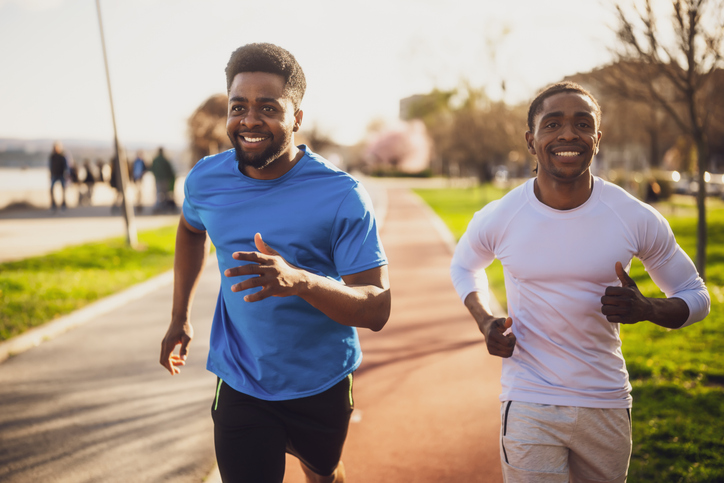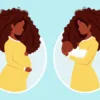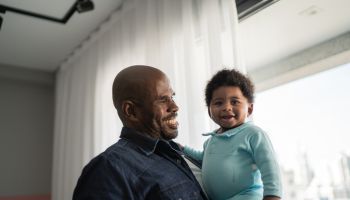
Source: Photodjo / Getty
The intersection of Men’s Health Month and Juneteenth is a critical and necessary time to discuss Black men’s health.
Black men’s health is often a neglected issue. Black men have the highest rates of heart disease and diabetes, are the least likely to seek mental health services, and are the least insured. Black men are often not asked to participate in clinical research or family-based programming, which can help improve health outcomes for future generations.
Juneteenth, which marks the end of slavery in the United States after the Civil War and represents freedom and celebration of Black culture, falls squarely in the middle—on our calendars and our public conscience. President Biden signed legislation in 2021 that made Juneteenth a federal holiday following the police killings of Black Americans, including Breonna Taylor and George Floyd.
Black women play a major role in Black men’s emotional and mental wellness and protection
We created IMAGE, a family-based program for Black male caregivers and girls, designed to support Black families in protecting Black girls’ sexual health on the Westside of Chicago. During the IMAGE program, it became evident to Dr. Crooks’ all-Black female team, including Strong and Johnson, that Black men lacked the emotional and mental support needed to protect and build healthy relationships with Black girls and women. The positive impact of IMAGE led Black men to ask our team to continue to create spaces for them to come together.
We created male support groups for Black men 18 and older. During the first meeting, the facilitators, which were two Black women, asked Black men what a “safe space” looks and feels like to them. Black men stated they needed an unbiased and non-judgmental space, as they often don’t feel safe enough to be vulnerable and express the structural challenges they face daily. Black men also described not feeling safe with Black women, although they are expected to be the “protector” and “provider” of Black families. Societally, Black men are criticized for showing any signs of emotions, which is why they don’t feel safe doing so.
Support group discussions centered heavily on relationship dynamics between Black men and women, trauma, unemployment, violence, incarceration, parenting, and mental health. Mental health and trauma awareness were topics that Black men needed sufficient attention and resources. Black men described how they often questioned if they should care about their mental health and acknowledged their trauma hadn’t been addressed or overcome. Black men desired Black women to be “protectors” of their emotional and mental well-being and create spaces where they could feel comfortable sharing and being vulnerable. The support groups allowed Black men to give and receive much-needed peer support, understanding, encouragement and motivation from each other.
In the media, groups of Black men are often associated with negative contexts such as gangs or athletes; we need to change this narrative as there is so much more to Black men. However, our support groups provided positive interactions and representation for Black men and may have positive implications for their families and communities. This experience created positive interactions and an intentional safe space for Black men. Overall, men described the support groups as being extremely powerful, necessary, and meaningful.
Facilitating Black male support groups encouraged us as Black women to be more aware of the positive male interactions in the community and how we can support them.
Black men’s health is often a neglected issue
It highlighted how Black women play a major role in Black men’s emotional and mental wellness and protection. Black women are natural protectors and nurturers, which can help Black men open up and feel safe enough to talk about their health. Black men and women are both often impacted by structural factors (racism, incarceration, and employment), which impact their ability to be healthy. Black men and women can come together to discuss how to overcome barriers set in place for their failure.
Black women can support Black men by demonstrating mutual respect for their feelings and emotions and holding space to discuss them. This may change the trajectory of challenges experienced by Black men in the community. Black women can teach and practice effective communication, consideration, self-preservation, and love within their relationships, which Black men often seek.
It shouldn’t be the responsibility of only Black women to create these spaces for Black men. Community, clinical and research settings should also welcome and support Black men in discussions about their health. Now is the time to uplift and provide spaces for Black men’s health so they can better care for themselves and our communities.
Let’s come together to protect, support, and empower Black men’s health—in June and beyond.
Alexis Strong is a community outreach coordinator for the IMAGE study at the University of Illinois Chicago and Program Coordinator for the Chicago Lawndale AMACHI Mentoring Program (LAMP) program.
Juquita Johnson is a Senior Community Outreach Coordinator for the IMAGE study at the University of Illinois Chicago, with over 15 years of experience working for the Illinois Department of Public Health.
Natasha Crooks is an Assistant Professor at the University of Illinois Chicago and a Public Voices Fellow with The OpEd Project.
SEE ALSO:
Black Fathers Are Most Involved In Their Children’s Lives: End The Fake News Stereotype!
A Father’s Day Gift: Calling For A Black Men’s Agenda



